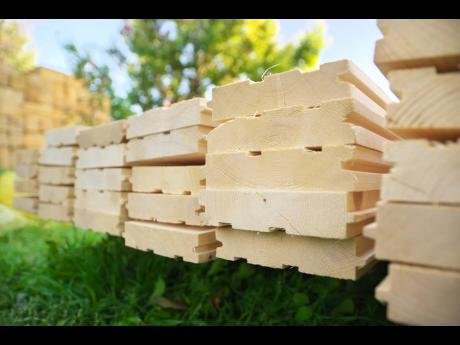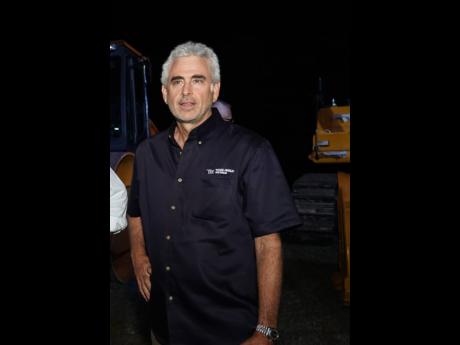Tank-Weld setting up lumber treatment plant
To rival Arc with Jamaica’s second facility
Construction company Tank-Weld is deepening its lumber operations through a new lumber treatment plant that’s expected to be commissioned by December. Tank-Weld is developing the treatment facility at Rio Bueno, Trelawny, at a cost of about $500...
Construction company Tank-Weld is deepening its lumber operations through a new lumber treatment plant that’s expected to be commissioned by December.
Tank-Weld is developing the treatment facility at Rio Bueno, Trelawny, at a cost of about $500 million, said Managing Director Chris Bicknell. The cost includes various inputs, such as land, which was already available, construction material, expertise and labour, he said.
It will become Jamaica’s second lumber treatment plant, with annual capacity of up to 60 million board feet of treated lumber. One board foot is 12x12 inches and one-inch thick.
Tank-Weld is a diversified company involved in commercial and industrial construction, transportation, and the manufacturing and distribution of construction inputs. It also operates a cargo port at Rio Bueno.
“What we aim to do with all this investment in manufacturing and the ports is to find those efficiencies in the logistics and manufacturing chains,” said Bicknell in an interview with the Financial Gleaner.
The company is trying to leverage its strength in various areas through backward and forward linkages in its value chain.
“This means bringing the boat straight from the supplier overseas and getting (the materials) to the customer using our own trucks, and so on. That drives the costs down and we pass that on to the customer,” Bicknell said.
Key to the system is a closed-loop pressure treatment autoclave. First, untreated lumber is placed into a large, horizontal treating cylinder. The door is sealed and a vacuum applied to remove most of the air from both the cylinder and the cells of the wood in the process. A preservative solution is then pumped into the cylinder and the created pressure forces the preservative solution into the empty wood cells. The result is pressure-treated lumber.
Bicknell projects that the new plant will be able to produce 50 million to 60 million board feet of lumber per year, running on two shifts. Savings are estimated to be in the order of seven to 17 per cent, plus the transportation savings, yielded by importing dry untreated lumber and using local water to mix the treatment solution.
The plant is about four to five months away from being fully commissioned.
“We’re going to start out producing about 30 million board feet running a single shift. If we get into exports, then we can run it about 50 million board feet per year.
Bicknell says bearing in mind the various input costs, such as land which was already available, construction material, expertise and labour, the total cost was in the order of $500 million.
Tank-Weld’s entry into the lumber treatment business provides competition for Jamaica’s sole treatment plant operated by Norman Horne’s Arc Manufacturing company in Kingston.
Horne, however, is putting a positive spin on the emerging rivalry, saying that with the new treatment plant coming on stream, Jamaica will have more than sufficient capacity to supply both the domestic and Caribbean markets.
He added that it was a good capital investment for Jamaica as, together, both companies can dominate the domestic market and participate in the Caribbean market, given the fact that Jamaica still imports a lot of treated lumber.
“Competition for us is not really a bad thing. We welcome the Tank-Weld treatment plant and hopefully, together we can work to satisfy the Jamaican market and the Caribbean market,” Horne said.
Statin estimates that just over $11 billion worth of wood and wood products were imported in 2021, the most current data available. Of this amount, just under $8 billion fell into the category of wood – mostly coniferous pine – that would normally need treatment before use.
Bicknell says Tank-Weld aims to bring a ‘more cost-effective’ product to the market.
The company’s Rio Bueno deep-water port has been operational since 2008. It handles imports of cement, reinforcing steel bars, or rebars, and lumber in break-bulk rather than containerised form.
Tank-Weld supplies both domestic and Caribbean markets with those products, alongside manufactured items such as chain-link fencing, nails, fabric mesh, roofing and purlins.
Bicknell said Jamaica is constrained by a lack of capacity to handle large break-bulk vessels from markets such as Turkey and China and was therefore at the mercy of shipping lines that exact heavy shipping charges for relatively small quantities of cargo.
“When we bring lumber from the USA, it comes to Rio Bueno,” said Bicknell.
“It is off-loaded and then it continues to the other islands, but there’s that big cavity in the vessel, which we can then load up with our materials and our trucks and get them down to the islands,” he said, adding that this is where business opportunity lies – that is, fully utilising available resources to satisfy a Caribbean market that needs imports in smaller quantities.



